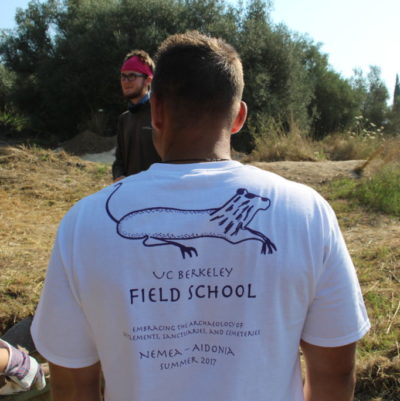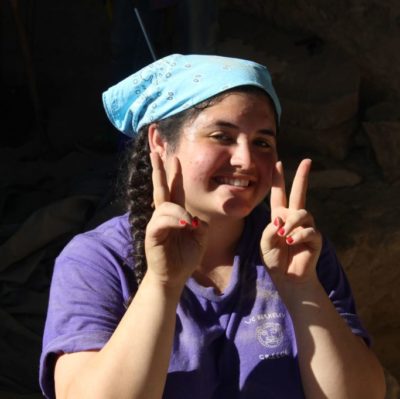Dig with us in Greece this summer!
Nearly every summer The Nemea Center for Classical Archaeology offers a field school for undergraduate students with an interest in archaeology. No previous experience in archaeology is required – only a strong desire to learn and dig! Not a student at Cal? No problem! Our Field School is open to undergraduate students from any accredited university in the U.S. (and beyond). If you are interested in learning more and/or applying, please send an email to our director, Dr. Kim Shelton, at sheltonk@berkeley.edu.
Currently, undergraduate students are welcome to join us for the excavation of the Mycenaean settlement at Tsoungiza this summer! The site is located right next door to the Sanctuary of Zeus at Nemea. Exact dates of the excavation will be shared soon, but students can expect to participate in all aspects of on-site excavation, cleaning, documentation, and study of the architecture as well as post-excavation artifact curation (activities include washing pottery, sorting finds, cataloging, drawing, 3D scanning, and more). Typically, students alternate between museum and field so that they experience the full range of activities. Work in the museum and/or on site happens 5 or 6 days per week from approximately 7:00am to 3:00pm. The afternoons are yours to relax and explore.
Apply now! Applications are due by Monday, February 16th, 2026. One letter of recommendation must also accompany your application and should be sent directly to the director, Kim Shelton, at sheltonk@berkeley.edu. Details & Application.


Official Course Description & Approximate Costs
The primary goal is to teach practical archaeological skills in a real research environment while gaining an understanding of the material culture of Greece throughout various periods of its prehistory and history. Students will participate in a variety of field techniques and research methodologies including when appropriate: regional and site survey and sampling, geophysical testing and mapping, field excavation, stratigraphic analysis, written, graphic and photographic recording of data and finds, cleaning and conservation of finds, scientific and stylistic pottery analysis, cataloging, and presentation of research results through collection and exhibition management.
In addition, an overall knowledge of the archaeological history of Ancient Greece will be attained through the recovery and analysis of material (architecture, sculpture, metalwork and ceramics) from a wide range of periods (prehistoric through Early Christian) and especially through travel to major archaeological and cultural sites of Greece. The course also provides a valuable opportunity to learn about a foreign country and its contemporary culture while living in a traditional village community and to gain a unique perspective on the life of the ancients while living in their own landscape.
No experience or prerequisites are required. Participation does mean, however, that you will spend a lot of time outdoors in the summer heat of southern Greece. You can expect a fair amount of physical exertion while you’re in the field and the optional trips sometimes include hikes or walks over rough terrain, so being in good physical condition is important. If you have old injuries or other conditions that may be aggravated from lifting, pushing, digging, hiking, etc., it is a good idea to get in touch with the director before applying.
Course credits (4-6 units) from UC Berkeley can be obtained by registering for Classics N172A and/or an independent study (at an additional cost). Costs include two fees: approx. $1,500 for food and lodging (in the nearby village of Kleonai) and an additional $1,000 to cover participation (transportation, supplies, etc.). Airfare is not included in these fees and is the responsibility of the participant. Airfare can range widely from $1,000 – $1,800 depending on where you fly from.
Please contact our Project Director, Dr. Kim Shelton (sheltonk@berkeley.edu), with inquiries or concerns in the meantime.








